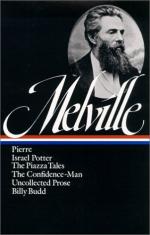But these experiences, both from their intensity and his solitude, were necessarily squalid. Best not enlarge upon them. For just as extreme suffering, without hope, is intolerable to the victim, so, to others, is its depiction without some corresponding delusive mitigation. The gloomiest and truthfulest dramatist seldom chooses for his theme the calamities, however extraordinary, of inferior and private persons; least of all, the pauper’s; admonished by the fact, that to the craped palace of the king lying in state, thousands of starers shall throng; but few feel enticed to the shanty, where, like a pealed knuckle-bone, grins the unupholstered corpse of the beggar.
Why at one given stone in the flagging does man after man cross yonder street? What plebeian Lear or Oedipus, what Israel Potter, cowers there by the corner they shun? From this turning point, then, we too cross over and skim events to the end; omitting the particulars of the starveling’s wrangling with rats for prizes in the sewers; or his crawling into an abandoned doorless house in St. Giles’, where his hosts were three dead men, one pendant; into another of an alley nigh Houndsditch, where the crazy hovel, in phosphoric rottenness, fell sparkling on him one pitchy midnight, and he received that injury, which, excluding activity for no small part of the future, was an added cause of his prolongation of exile, besides not leaving his faculties unaffected by the concussion of one of the rafters on his brain.
But these were some of the incidents not belonging to the beginning of his career. On the contrary, a sort of humble prosperity attended him for a time; insomuch that once he was not without hopes of being able to buy his homeward passage so soon as the war should end. But, as stubborn fate would have it, being run over one day at Holborn Bars, and taken into a neighboring bakery, he was there treated with such kindliness by a Kentish lass, the shop-girl, that in the end he thought his debt of gratitude could only be repaid by love. In a word, the money saved up for his ocean voyage was lavished upon a rash embarkation in wedlock.
Originally he had fled to the capital to avoid the dilemma of impressment or imprisonment. In the absence of other motives, the dread of those hardships would have fixed him there till the peace. But now, when hostilities were no more, so was his money. Some period elapsed ere the affairs of the two governments were put on such a footing as to support an American consul at London. Yet, when this came to pass, he could only embrace the facilities for a return here furnished, by deserting a wife and child, wedded and born in the enemy’s land.




